Charles E W Bean, Diaries, AWM38 3DRL 606/255/1 - 1916 - 1937 - Part 2
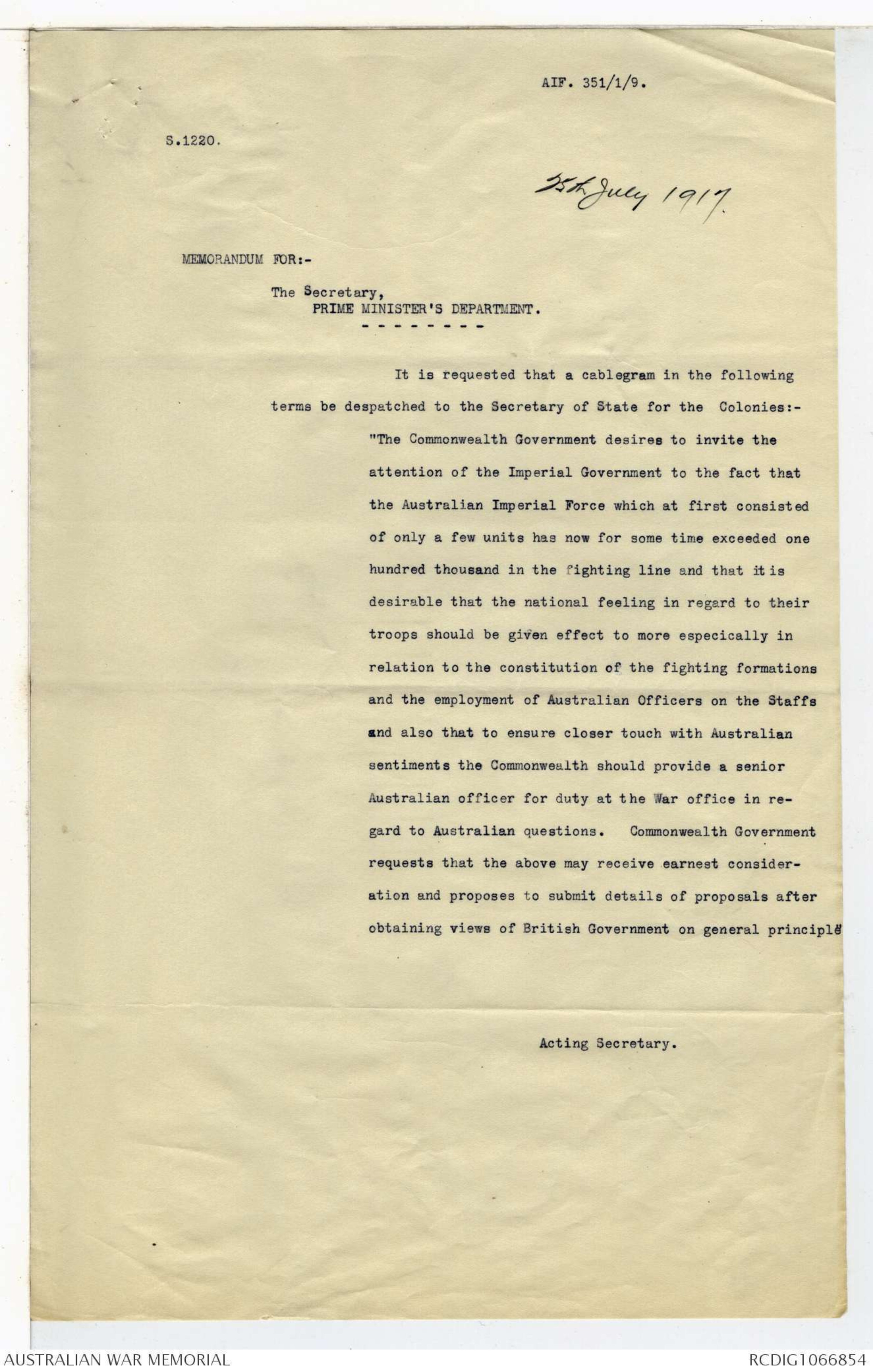
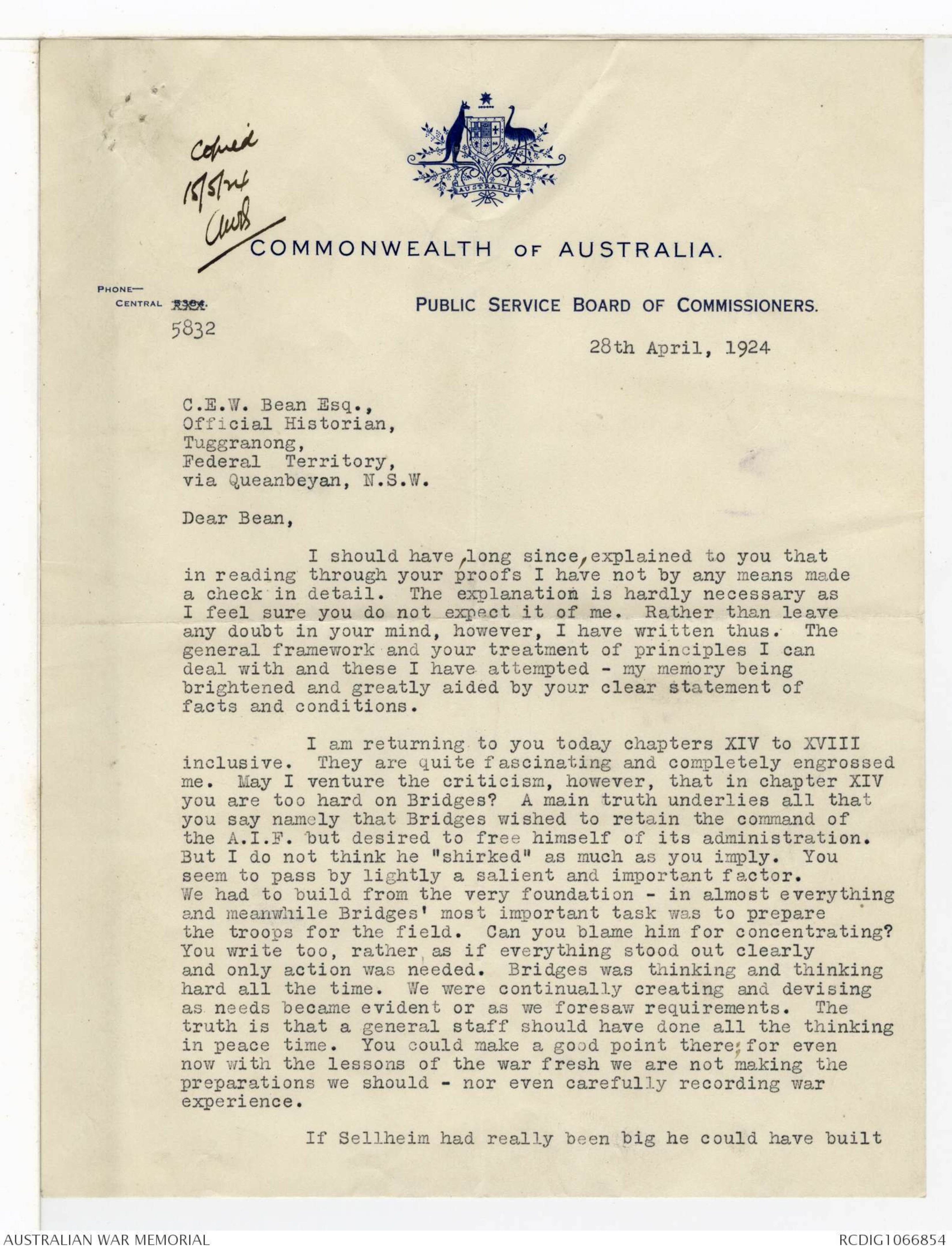
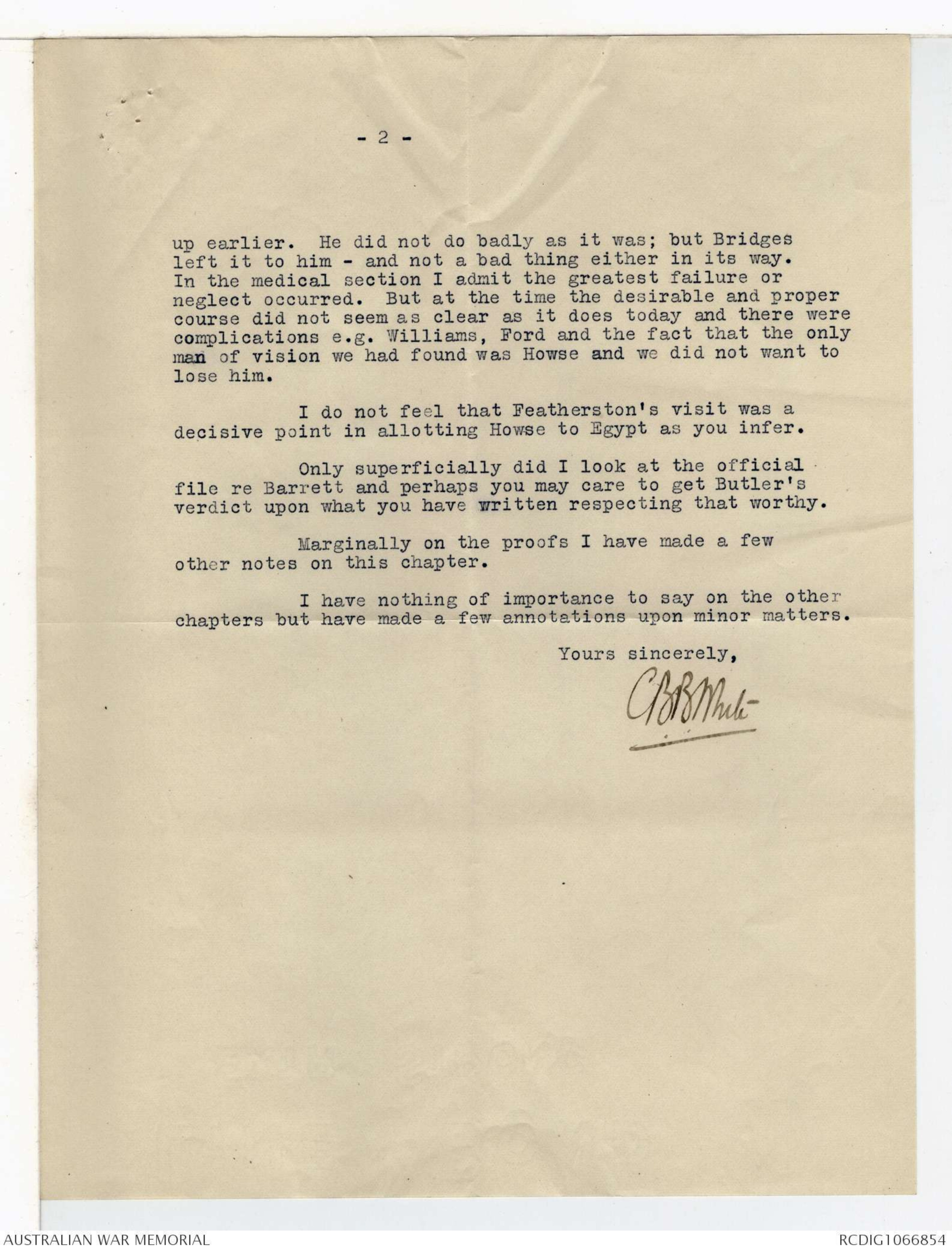
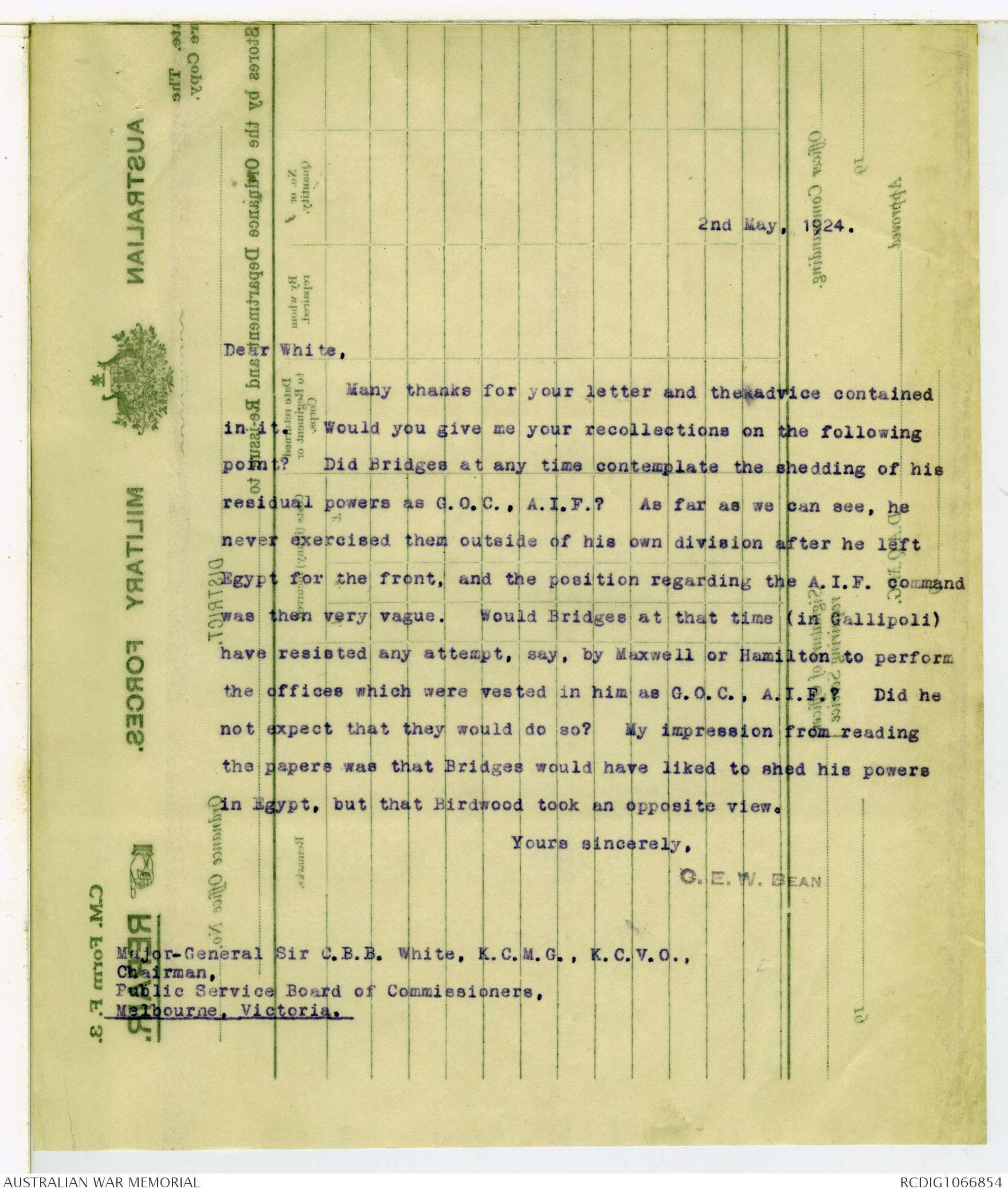
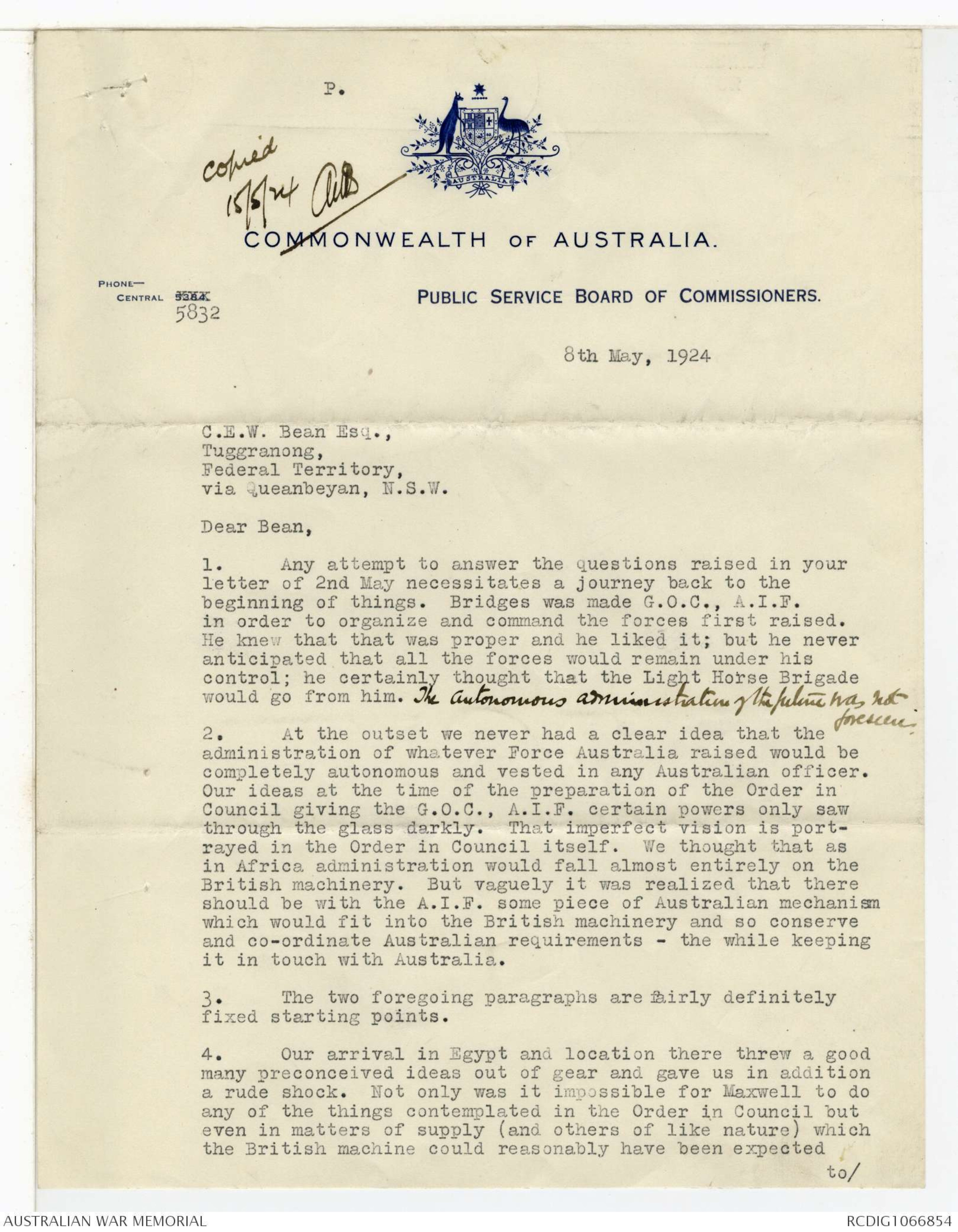
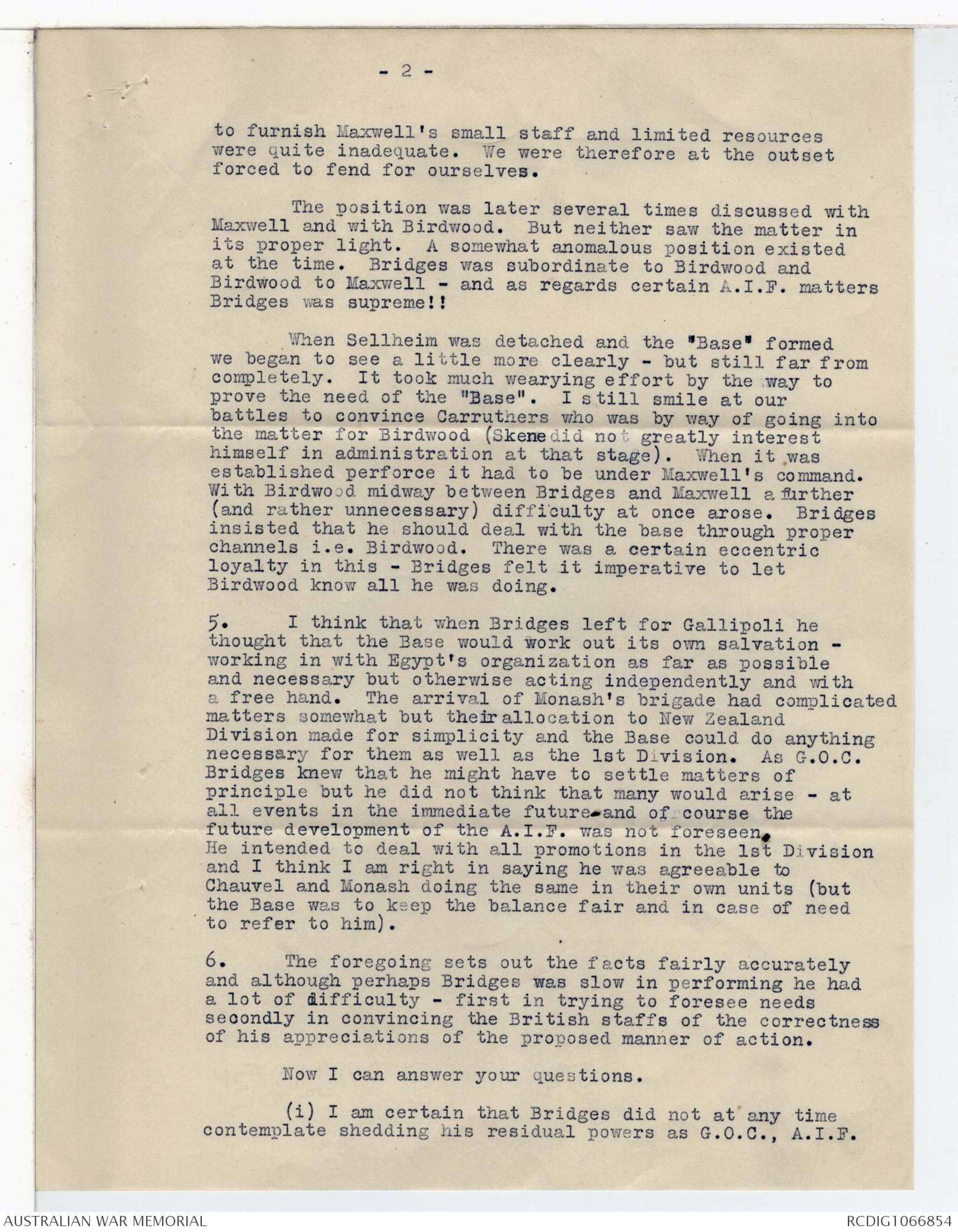
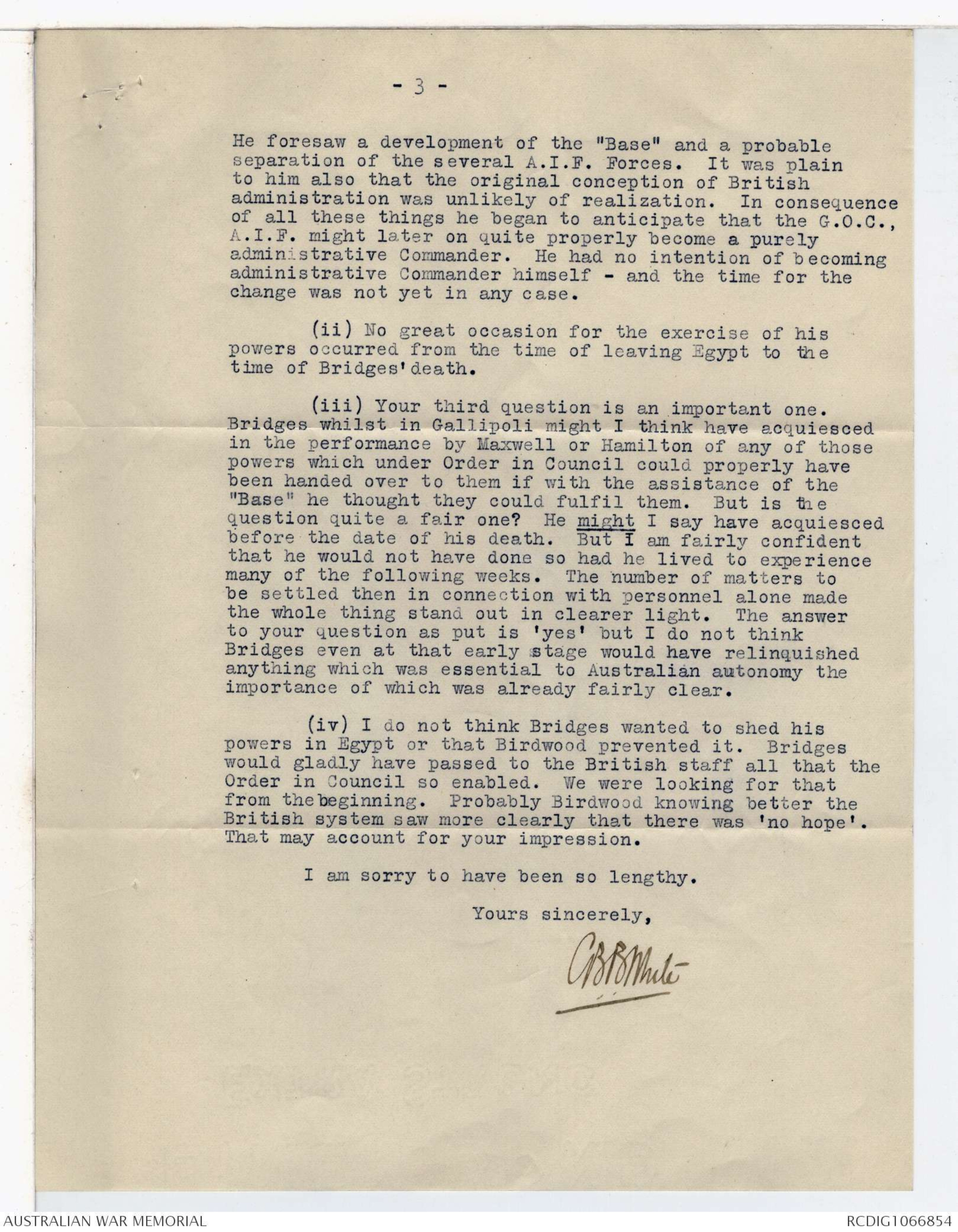
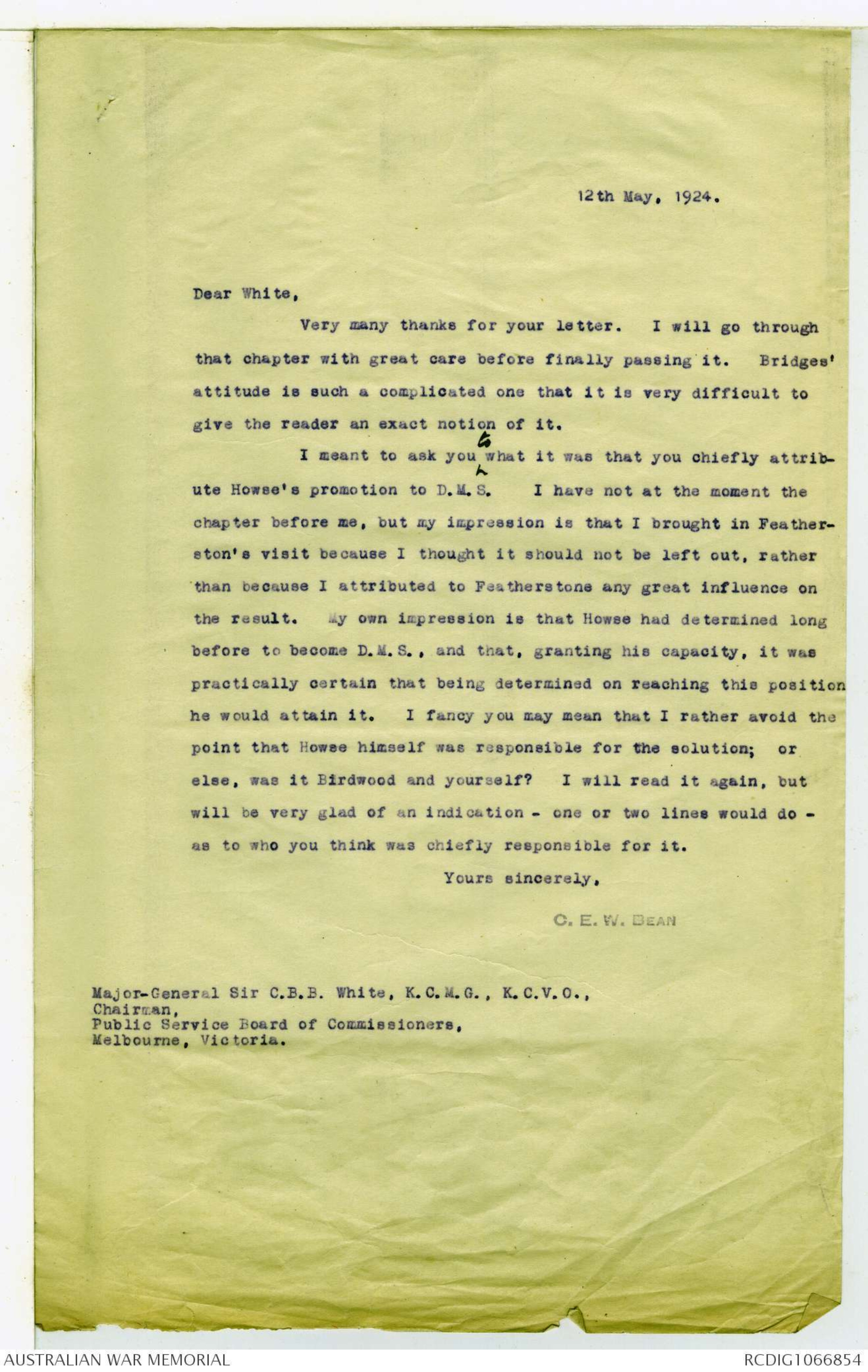
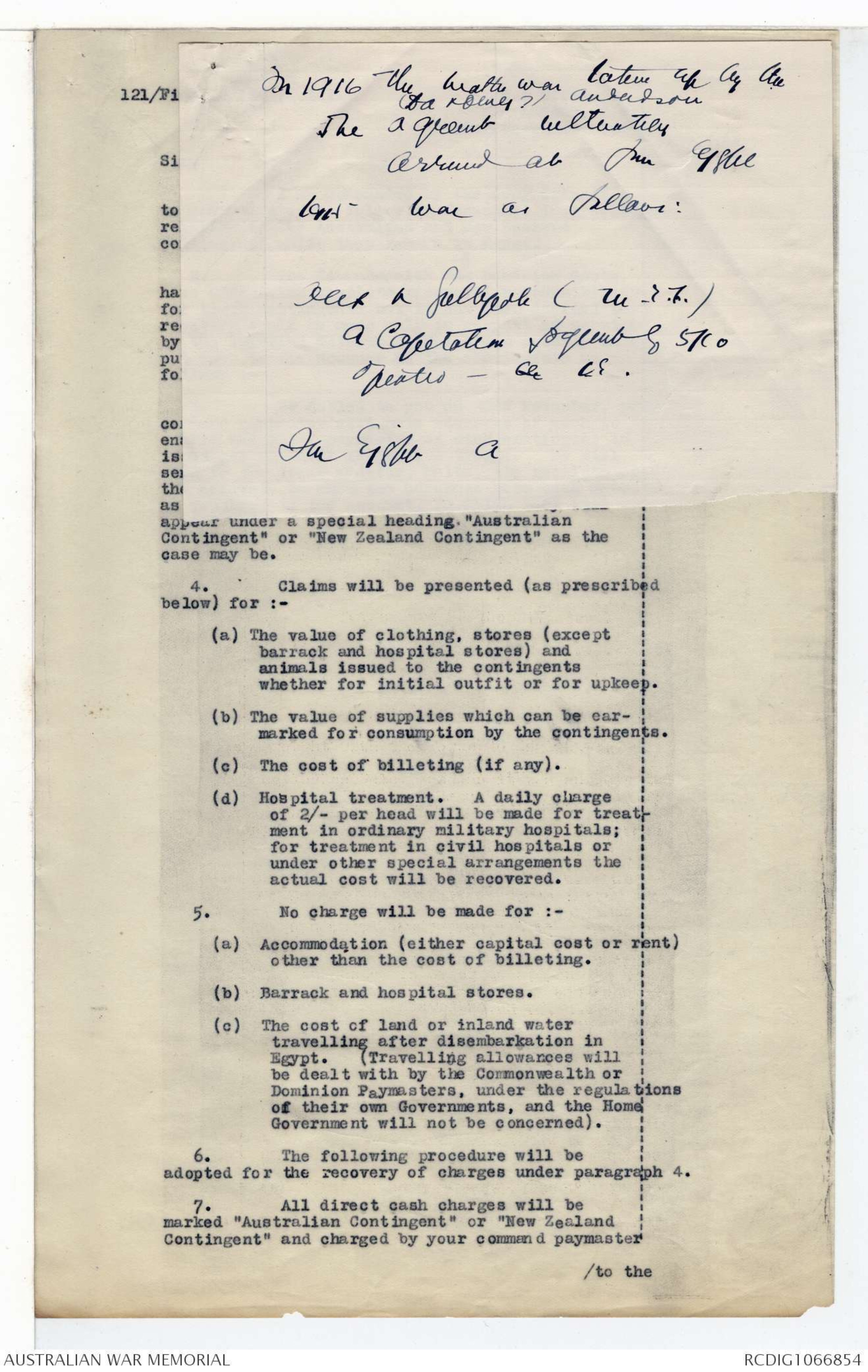
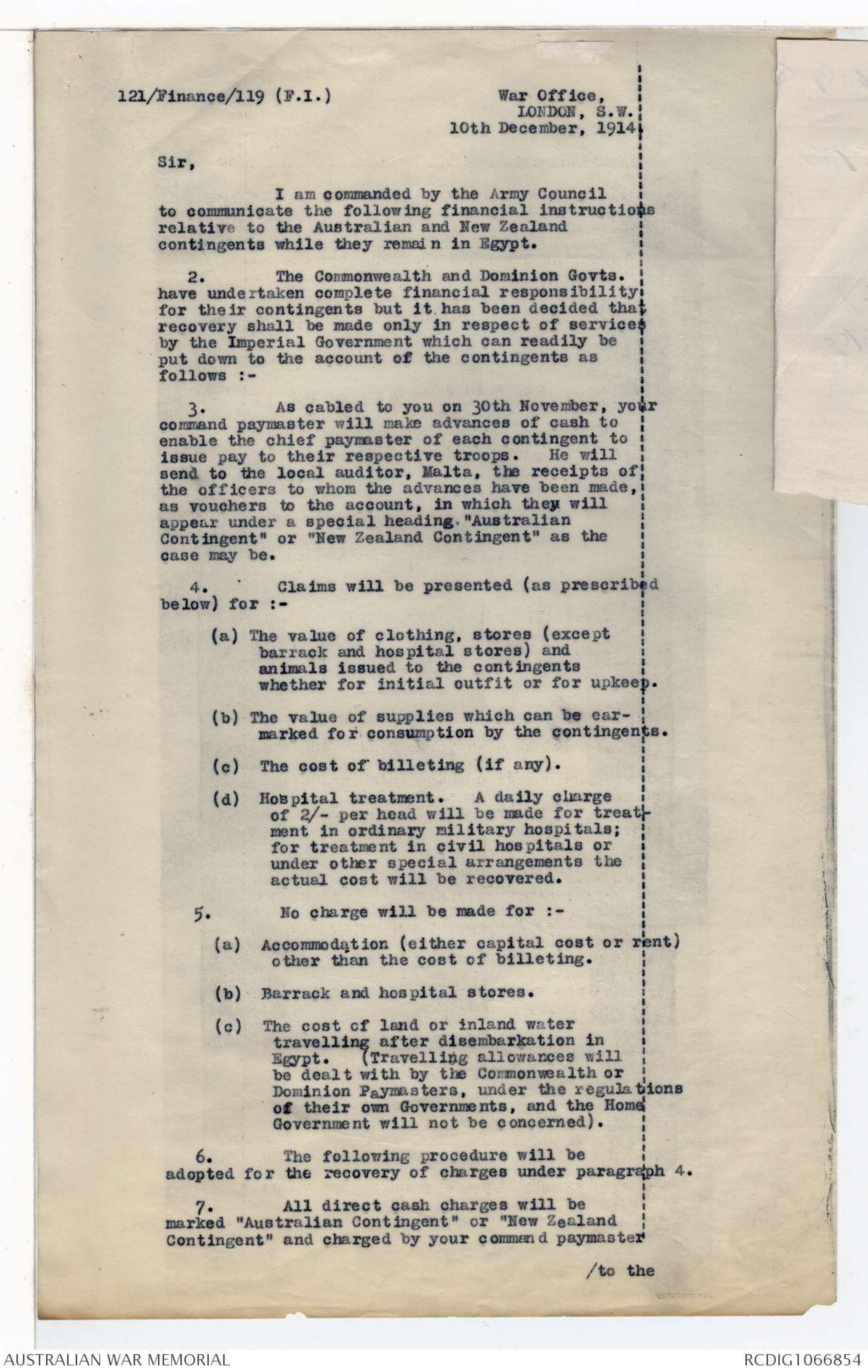
AIF. 351/1/9.
S.1220.
25th July 1917.
MEMORANDUM FOR:-
The Secretary,
PRIME MINISTER'S DEPARTMENT.
It is requested that a cablegram in the following
terms be despatched to the Secretary of State for the Colonies:-
"The Commonwealth Government desires to invite the
attention of the Imperial Government to the fact that
the Australian Imperial Force which at first consisted
of only a few units has now for some time exceeded one
hundred thousand in the fighting line and that it is
desirable that the national feeling in regard to their
troops should be given effect to more especially in
relation to the constitution of the fighting formations
and the employment of Australian Officers on the Staffs
and also that to ensure closer touch with Australian
sentiments the Commonwealth should provide a senior
Australian officer for duty at the War office in regard
to Australian questions. Commonwealth Government
requests that the above may receive earnest consideration
and proposes to submit details of proposals after
obtaining views of British Government on general principle
Acting Secretary.
[*Copied
15/5/24
AWB*]
COMMONWEALTH OF AUSTRALIA.
Phone—
Central 5384 5832
PUBLIC SERVICE BOARD OF COMMISSIONERS.
28th April, 1924
C.E.W. Bean Esq.,
Official Historian,
Tuggranong,
Federal Territory,
via Queanbeyan, N.S.W.
Dear Bean,
I should have ,long since, explained to you that
in reading through your proofs I have not by any means made
a check in detail. The explanation is hardly necessary as
I feel sure you do not expect it of me. Rather than leave
any doubt in your mind, however, I have written thus. The
general framework and your treatment of principles I can
deal with and these I have attempted - my memory being
brightened and greatly aided by your clear statement of
facts and conditions.
I am returning to you today chapters XIV to XVIII
inclusive. They are quite fascinating and completely engrossed
me. May I venture the criticism, however, that in chapter XIV
you are too hard on Bridges? A main truth underlies all that
you say namely that Bridges wished to retain the command of
the A.I.F. but desired to free himself of its administration.
But I do not think he "shirked" as much as you imply. You
seem to pass by lightly a salient and important factor.
We had to build from the very foundation - in almost everything
and meanwhile Bridges' most important task was to prepare
the troops for the field. Can you blame him for concentrating?
You write too, rather, as if everything stood out clearly
and only action was needed. Bridges was thinking and thinking
hard all the time. We were continually creating and devising
as needs became evident or as we foresaw requirements. The
truth is that a general staff should have done all the thinking
in peace time. You could make a good point there; for even
now with the lessons of the war fresh we are not making the
preparations we should - nor even carefully recording war
experience.
If Sellheim had really been big he could have built
2
up earlier. He did not do badly as it was; but Bridges
left it to him - and not a bad thing either in its way.
In the medical section I admit the greatest failure or
neglect occurred. But at the time the desirable and proper
course did not seem as clear as it does today and there were
complications e.g. Williams, Ford and the fact that the only
man of vision we had found was Howse and we did not want to
lose him.
I do not feel that Featherston's visit was a
decisive point in allotting Howse to Egypt as you infer.
Only superficially did I look at the official
file re Barrett and perhaps you may care to get Butler's
verdict upon what you have written respecting that worthy.
Marginally on the proofs I have made a few
other notes on this chapter.
I have nothing of importance to say on the other
chapters but have made a few annotations upon minor matters.
Yours sincerely,
C B B White
2nd May, 1924.
Dear White,
Many thanks for your letter and the advice contained
in it. Would you give me your recollections on the following
point? Did Bridges at any time contemplate the shedding of his
residual powers as G.O.C., A.I.F.? As far as we can see, he
never exercised them outside of his own division after he left
Egypt for the front, and the position regarding the A.I.F. command.
was then very vague. Would Bridges at that time (in Gallipoli)
have resisted any attempt, say, by Maxwell or Hamilton perform
the offices which were vested in him as G.O.C., A.I.F.? Did he
not expect that they would do so? My impression from reading
the papers was that Bridges would have liked to shed his powers
in Egypt. but that Birdwood took an opposite view.
Yours sincerely,
C.E.W. Bean
Major-General Sir C.B.B. White, K.C.M.G., K.C.V.O.,
Chairman,
Public Service Board of Commissioners,
Melbourne, Victoria.
P.
[*Copied
15/5/24
AWB.*]
COMMONWEALTH OF AUSTRALIA.
PUBLIC SERVICE BOARD OF COMMISSIONERS.
PHONE -
CENTRAL 5384
5832
8th May, 1924
C.E.W. Bean Esq.,
Tuggranong,
Federal Territory,
via Queanbeyan, N.S.W.
Dear Bean,
1. Any attempt to answer the questions raised in your
letter of 2nd May necessitates a journey back to the
beginning of things. Bridges was made G.O.C., A.I.F.
in order to organize and command the forces first raised.
He knew that that was proper and he liked it; but he never
anticipated that all the forces would remain under his
control; he certainly thought that the Light Horse Brigade
would go from him. The autonomous administration of the future was not
foreseen.
2. At the outset we never had a clear idea that the
administration of whatever Force Australia raised would be
completely autonomous and vested in any Australian officer.
Our ideas at the time of the preparation of the Order in
Council giving the G.O.C., A.I.F. certain powers only saw
through the glass darkly. That imperfect vision is portrayed
in the Order in Council itself. We thought that as
in Africa administration would fall almost entirely on the
British machinery. But vaguely it was realized that there
should be with the A.I.F. some piece of Australian mechanism
which would fit into the British machinery and so conserve
and co-ordinate Australian requirements - the while keeping
it in touch with Australia.
3. The two foregoing paragraphs are fairly definitely
fixed starting points.
4. Our arrival in Egypt and location there threw a good
many preconceived ideas out of gear and gave us in addition
a rude shock. Not only was it impossible for Maxwell to do
any of the things contemplated in the Order in Council but
even in matters of supply (and others of like nature) which
the British machine could reasonably have been expected to/
2
to furnish Maxwell's small staff and limited resources
were quite inadequate. We were therefore at the outset
forced to fend for ourselves.
The position was later several times discussed with
Maxwell and with Birdwood. But neither saw the matter in
its proper light. A somewhat anomalous position existed
at the time. Bridges was subordinate to Birdwood and
Birdwood to Maxwell - and as regards certain A.I.F. matters
Bridges was supreme!!
When Sellheim was detached and the "Base" formed
we began to see a little more clearly - but still far from
completely. It took much wearying effort by the way to
prove the need of the "Base". I still smile at our
battles to convince Carruthers who was by way of going into
the matter for Birdwood (Skene did not greatly interest
himself in administration at that stage). When it was
established perforce it had to be under Maxwell's command.
With Birdwood midway between Bridges and Maxwell a further
(and rather unnecessary) difficulty at once arose. Bridges
insisted that he should deal with the base through proper
channels i.e. Birdwood. There was a certain eccentric
loyalty in this - Bridges felt it imperative to let
Birdwood know all he was doing.
5. I think that when Bridges left for Gallipoli he
thought that the Base would work out its own salvation -
working in with Egypt's organisation as far as possible
and necessary but otherwise acting independently and with
a free hand. The arrival of Monash's brigade had complicated
matters somewhat but their allocation to New Zealand
Division made for simplicity and the Base could do anything
necessary for them as well as the 1st Division. As G.O.C.
Bridges knew that he might have to settle matters of
principle but he did not think that many would arise - at
all events in the immediate future - and of course the
future development of the A.I.F. was not foreseen.
He intended to deal with all promotions in the 1st Division
and I think I am right in saying he was agreeable to
Chauvel and Monash doing the same in their own units (but
the Base was to keep the balance fair and in case of need
to refer to him).
6. The foregoing sets out the facts fairly accurately
and although perhaps Bridges was slow in performing he had
a lot of difficulty - first in trying to foresee needs
secondly in convincing the British staffs of the correctness
of his appreciations of the proposed manner of action.
Now I can answer your questions.
(i) I am certain that Bridges did not at any time
contemplate shedding his residual powers as G.O.C., A.I.F.
3
He foresaw a development of the "Base" and a probable
separation of the several A.I.F. Forces. It was plain
to him also that the original conception of British
administration was unlikely of realization. In consequence
of all these things he began to anticipate that the G.O.C.,
A.I.F. might later on quite properly become a purely
administrative Commander. He had no intention of becoming
administrative Commander himself - and the time for the
change was not yet in any case.
(ii) No great occasion for the exercise of his
powers occurred from the time of leaving Egypt to the
time of Bridges' death.
(iii) Your third question is an important one.
Bridges whilst in Gallipoli might I think have acquiesced
in the performance by Maxwell or Hamilton of any of those
powers which under Order in Council could properly have
been handed over to them if with the assistance of the
"Base" he thought they could fulfil them. But is the
question quite a fair one? He might I say have acquiesced
before the date of his death. But I am fairly confident
that he would not have done so had he lived to experience
many of the following weeks. The number of matters to
be settled then in connection with personnel alone made
the whole thing stand out in clearer light. The answer
to your question as put is 'yes' but I do not think
Bridges even at that early stage would have relinquished
anything which was essential to Australian autonomy the
importance of which was already fairly clear.
(iv) I do not think Bridges wanted to shed his
powers in Egypt or that Birdwood prevented it. Bridges
would gladly have passed to the British staff all that the
Order in Council so enabled. We were looking for that
from the beginning. Probably Birdwood knowing better the
British system saw more clearly that there was 'no hope'.
That may account for your impression.
I am sorry to have been so lengthy.
Yours sincerely,
C B B White
12th May 1924.
Dear White,
Very many thanks for your letter. I will go through
that chapter with great care before finally passing it. Bridges'
attitude is such a complicated one that it is very difficult to
give the reader an exact notion of it.
I meant to ask you ^to what it was that you chiefly attribute
Howse's promotion to D.M.S. I have not at the moment the
chapter before me, but my impression is that I brought in Featherston's
visit because I thought it should not be left out, rather
than because I attributed to Featherstone any great influence on
the result. My own impression is that Howse had determined long
before to become D.M.S., and that, granting his capacity, it was
practically certain that being determined on reaching this position
he would attain it. I fancy you may mean that I rather avoid the
point that Howse himself was responsible for the solution; or
else, was it Birdwood and yourself? I will read it again, but
will be very glad of an indication - one or two lines would do -
as to who you think was chiefly responsible for it.
Yours sincerely,
C. E. W. BEAN
Major-General Sir C.B.B. White, K.C.M.G., K.C.V.O.,
Chairman,
Public Service Board of Commissioners,
Melbourne, Victoria.
In 1916 the matter [(Da & Olney?] was taken up by Ctee
Anderson
The agreement ultimately
arrived at from [?]
1915 was as follows:
[?] a [Gallipoli?] ([M.I.F.?])
A [?] [?] [?]
Operatns - [?] [?]
121/Finance/119 (F.I.)
War Office
LONDON, S.W.
10th December, 1914.
Sir,
I am commanded by the Army Council
to communicate the following financial instructions
relative to the Australian and New Zealand
contingents while they remain in Egypt.
2. The Commonwealth and Dominion Govts.
have undertaken complete financial responsibility
for their contingents but it has been decided that
recovery shall be made only in respect of services
by the Imperial Government which can readily be
put down to the account of the contingents as
follows :-
3. As cabled to you on 30th November, your
command paymaster will make advances of cash to
enable the chief paymaster of each contingent to
issue pay to their respective troops. He will
send to the local auditor, Malta, the receipts of
the officers to whom the advances have been made,
as vouchers to the account, in which they will
appear under a special heading "Australian
Contingent" or "New Zealand Contingent" as the
case may be.
4. Claims will be presented (as prescribed
below) for :-
(a) The value of clothing, stores (except
barrack and hospital stores) and
animals issued to the contingents
whether for initial outfit or for upkeep.
(b) The value of supplies which can be earmarked
for consumption by the contingents.
(c) The cost of billeting (if any).
(d) Hospital treatment. A daily charge
of 2/- per head will be made for treatment
in ordinary military hospitals;
for treatment in civil hospitals or
under other special arrangements the
actual cost will be recovered.
5. No charge will be made for :-
(a) Accommodation (either capital cost or rent)
other than the cost of billeting.
(b) Barrack and hospital stores.
(c) The cost of land or inland water
travelling after disembarkation in
Egypt. (Travelling allowances will
be dealt with by the Commonwealth or
Dominion Paymasters, under the regula tions
of their own Governments, and the Home
Government will not be concerned).
6. The following procedure will be
adopted for the recovery of charges under paragraph 4.
7. All direct cash charges will be
marked "Australian Contingent" or "New Zealand
Contingent" and charged by your comman d paymaster
/to the
 Sam scott
Sam scottThis transcription item is now locked to you for editing. To release the lock either Save your changes or Cancel.
This lock will be automatically released after 60 minutes of inactivity.